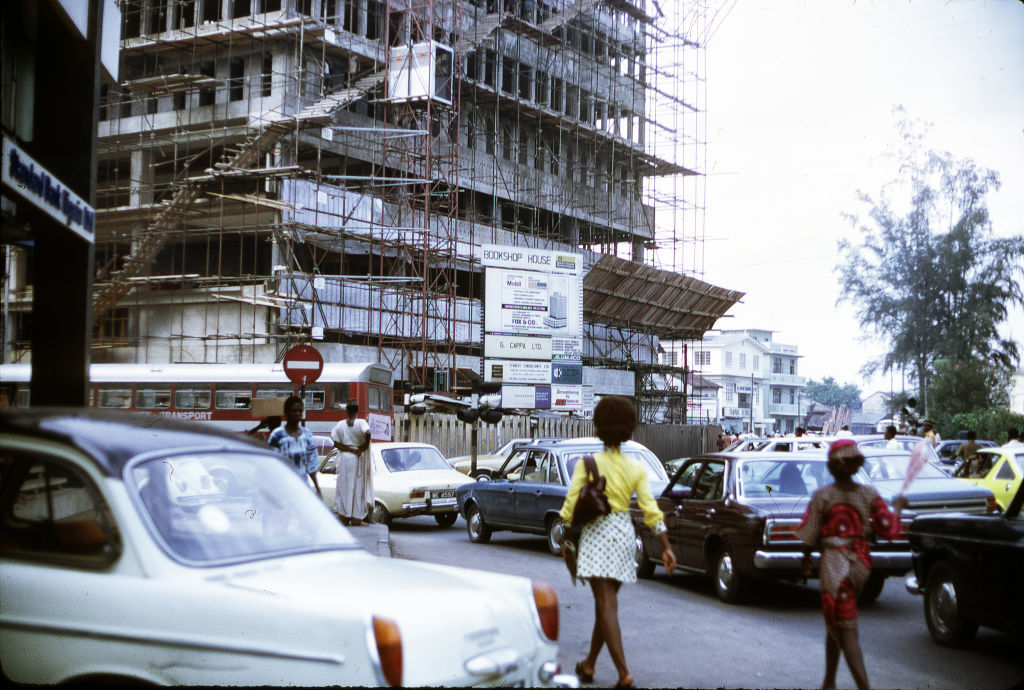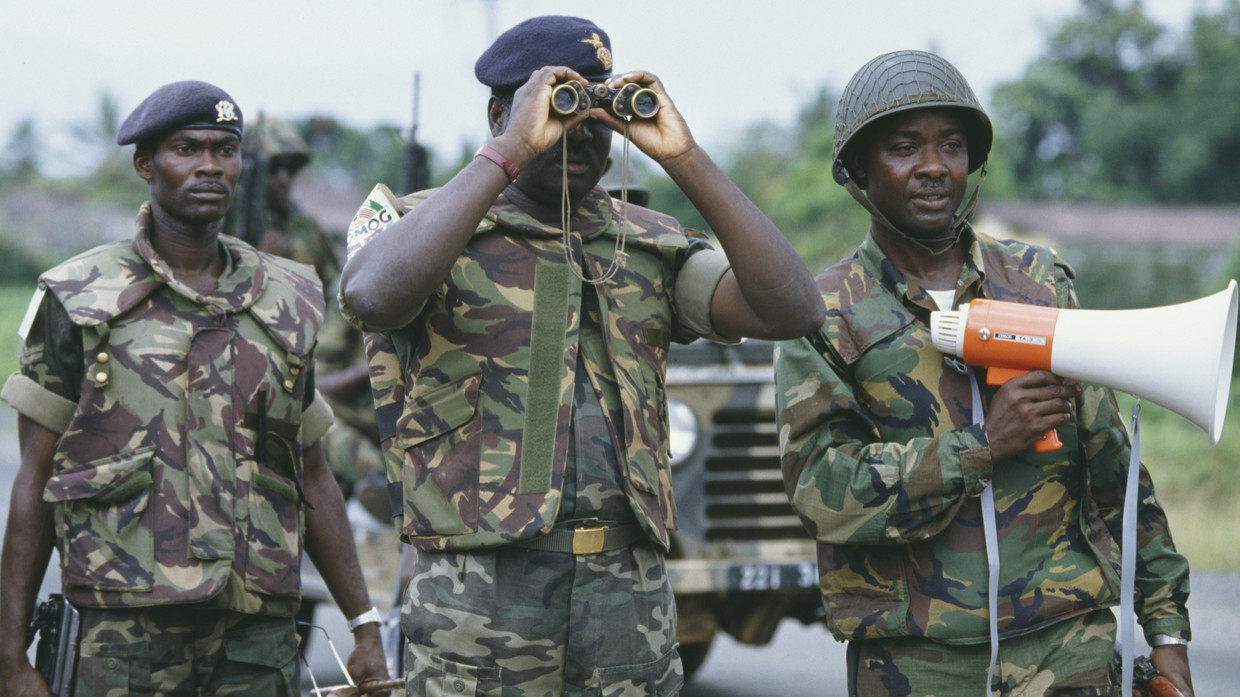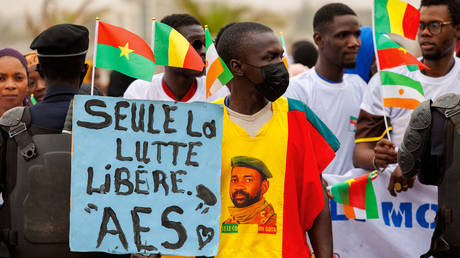West Africa has built one of the most prosperous economic communities on the continent. The Economic Community of West African States (ECOWAS) is one of the few blocs in Africa which, being nearly a customs union, has ample opportunity to set the rules for all of its member states.
However, the region, particularly the Sahel, has faced significant challenges with instability and terrorist activity. The union’s inability to meet the challenges and expectations of the national authorities in member states has resulted in negative responses from some. Currently, there appears to be opposition between ECOWAS, a would-be customs union, and the new regional organization, Alliance of Sahel States (Alliance des États du Sahel, or AES, in French), which encompasses Mali, Burkina Faso, and Niger. The three countries have announced their withdrawal from ECOWAS to form their own organization based on Pan-Africanist values.
Tensions run high
The effects of French “direct rule” are considered one of the causes of instability in the region. This practice involved the destruction of pre-colonial power structures and their replacement with new European-style ones. Over half of the ECOWAS members are former French colonies, including Benin, Burkina Faso, Ivory Coast (Cote d’Ivoire), Guinea, Mali, Niger, Senegal, and Togo. Due to the military’s historically strong political influence in former French colonies, the risk of military coups in these countries is particularly high. ECOWAS is well prepared for such events and reacts promptly to coups. The organization imposes strict sanctions on states that are led by the military.

Before the July coup in Niger, the military authorities of Mali and Burkina Faso had been attempting to repair their relationship with the bloc and establish cooperation on terms that better suited their needs. In other words, the countries’ leaders sought to regain bloc membership without adhering to the ECOWAS mandate to hold democratic elections. Because Mali and Burkina Faso have not yet ended their transitional periods and have repeatedly missed the various deadlines set by ECOWAS, their frozen membership could continue indefinitely.
Both countries requested that ECOWAS and the African Union (AU) lift earlier sanctions, citing their destabilizing effect on the region. However, when the community continued to insist on a transition from military to civilian rule, Bamako and Ouagadougou realized that their membership would not be restored as things stood. Therefore, cooperation between the organization and established authorities in these countries became impossible. Even though ECOWAS demands were met conditionally, under the threat of more severe sanctions, the final goal was never achieved.
The military coup in Niger last July further exacerbated the already tense relations between ECOWAS, Mali, and Burkina Faso. The response to the coup in Niamey was considerably more severe than in the cases of Bamako and Ouagadougou. Niger was immediately subjected to a package of severe sanctions, and preparations for military intervention began. ECOWAS repeatedly failed in its attempts to persuade these states to comply with its demands for a transition to civilian rule and a general stabilization of the region, so in December it reaffirmed its commitment to the principle of “zero tolerance” for undemocratic transfers of power and to the application of the most rigorous sanctions.
Withdrawal announcement
On January 28, Mali, Burkina Faso, and Niger announced their withdrawal from ECOWAS in a joint statement, citing it as a sovereign decision. The communiqué stated that the organization had moved far away from the values of its founders and of Pan-Africanism during its 49 years of existence. With the departure of the trio, the organization could lose at least 45 billion CFA francs ($73.9 million) in union levies annually, believes Aboubakar Nacanabo, the Burkinabe minister of economy, finance and foresight. Hence, the AU proposed mediation to preserve the “irreplaceable unity of ECOWAS and strengthen African solidarity”.
The leaders of the Sahel trio have expressed concern that the union is exceeding its authority by imposing such heavy sanctions. The Malian Ministry of Foreign Affairs issued a communiqué explaining the reasons for withdrawing from ECOWAS (the communiqué itself is no longer available on the internet). According to the document, the organization violated Mali’s right of access to the sea and freedom of transit under the UN Convention by closing the borders. These breaches of rights render the ECOWAS Treaty “invalid.” A similar position is expressed in documents issued by the other two states.
From economic community to political regulator
Integration offers economic benefits, but it also requires participating states to make some sovereignty sacrifices. However, voluntary participation is always required for this process. Currently, ECOWAS bears little resemblance to the European Union in terms of its structure and institutions. The EU is the most deeply integrated group at the present stage, and its members have partially devolved powers to supranational bodies.
Nevertheless, when ECOWAS was established, there was no question that West African countries would have to relinquish some of their sovereignty. On the contrary, the original ECOWAS Treaty of 1975 did not strictly require countries to follow the principles outlined in the document. This allowed for significant political flexibility, while also creating new economic opportunities through ECOWAS trade liberalization goals.
The organization originally envisioned security cooperation, but not in the format one imagines today when thinking of ECOWAS. In the context of the Sahel trio’s withdrawal from the Community, Malian Foreign Minister Abdoulaye Diop noted: “ECOWAS has gradually become a threat to our countries. It has transformed into a tool in the fight against the organs of power and the peoples of our countries, introducing coercive measures that harm our people. It even poses a threat of military intervention. It is the organization we ourselves founded.”
Nowadays, ECOWAS exercises the role of political regulator. According to Dr. Franklin Nyamsi, African Freedom Institute President, who spoke to RT, this kind of status was acquired by the organization following a summit in July 1991 and was spelled out in the Declaration of Political Principles.
“The original aim of ECOWAS, as an organization for the economic integration of West Africa, was sidetracked by this Declaration, inspired by the infamous La Baule Speech delivered by French President Francois Mitterrand at Africa-France summit on June 20, 1990,” Dr. Nyamsi commented.
The speech, named after the summit venue of La Baule-Escoublac in western France, launched a new phase of Franco-African relations. After this, economic cooperation and development became conditional upon the continent’s adherence to the norms of pluralist democracy. As the then-French president emphasized, “it is the path of freedom that you are taking at the same time as you are taking the path of development.”
Dr. Nyamsi believes that the values of pluralist democracy have fragmented the African political field into political parties determined by ethnicity, which later weakened these countries by “democratic quarrels.” The African authorities were compelled to accept the ultraliberal policies of the International Monetary Fund and World Bank, leaving them with no other option. This enabled France to reinforce its neocolonial policy by politicizing ECOWAS.
The organization’s mandate did not originally include military measures. The treaty allowed for intervention only in specific cases, such as when a member state faced external aggression or if a military conflict arose between two member states. ECOWAS intervention in internal conflicts was only necessary if they were actively maintained and sustained from outside. Domestic affairs remained the responsibility of national authorities and were not under the purview of ECOWAS.
Revised treaty
In 1993, the ECOWAS Treaty was revised, after which the organization began to establish supranational bodies. At that time, the development of the community took a new path. The new treaty granted the organization the power to impose sanctions if a signatory fails to fulfill its obligations to the community. The sanctions toolkit, according to the document, included “suspension of new community loans or assistance; suspension of disbursement on ongoing community projects or assistance programs; exclusion from presenting candidates for statutory and professional posts; suspension of voting rights, and suspension from participating in the activities of the community.”
As Dr. Chidebe M. Nwankwo, researcher at University of Nigeria, writes, the ECOWAS security mechanism may be called the most effective supranational organ in the community. What is more, it is “considered by some as modernizing international law by setting the pace for the institutionalization of humanitarian intervention at regional level in Africa.” During its existence, ECOWAS has conducted six military operations in Liberia, Sierra Leone, Guinea-Bissau, Ivory Coast, Mali (counterterrorism), and the Gambia.
Finalizing mechanism of intervention
ECOWAS has a monitoring group called ECOMOG, which is formed under Article 13 of the Protocol Relating on Mutual Assistance in Defense (initially known as Allied Forces, but the organization later changed its name to ECOMOG). The participating countries contribute national armed forces, police, and gendarmerie to form the contingent.
When the protocol mentioned above was signed in 1981, the community believed that internal conflicts did not require intervention. However, ECOWAS has since evolved and expanded its authority.
The modern essence of ECOWAS was finalized in 1999 with the adoption of the Protocol Relating to the Mechanism for Conflict Prevention, Management, Resolution, Peace-Keeping and Security, which outlined the principles of the use of force and the possibility of political or military intervention.
As stated in the protocol, the security mechanism can be applied in the event of a serious and massive violation of human rights and the rule of law, an overthrow or attempted overthrow of a democratically elected government, or any other situation as decided by the Mediation and Security Council.
Liptako-Gourma: towards a new alliance
The Sahel trio took their first steps in aligning under their own rules on September 16, when thecountries announced the creation of the Alliance of Sahel States (AES). The coup in neighboring Niger further solidified the basis for a more serious union of “outsiders.” The military leader of Mali, Assimi Goita, published information about the signing of the Liptako-Gourma Charter, named after their border region.
The AES founding document legally consolidated earlier statements that Bamako and Ouagadougou would perceive the ECOWAS intervention in Niger as a declaration of war against themselves. The new Charter considers any infringement on the sovereignty and territorial integrity of one or more signatories as an “aggression” against all the members. This would necessitate the aid of one or more signatories, including the use of force if necessary.
Dr. Nyamsi highlights that “the shared military resources of the three countries, all of which are allies of the major powers of the Global South, make them difficult targets for attack by the vassal and neocolonized ECOWAS states.” France, which has historically imposed its policies while destroying local power structures since colonial times, “will also find it very difficult to confront Mali, Burkina Faso, and Niger, united in the AES from which it has been militarily dismantled.”
The Alliance is a political and military bloc with the objective of creating a regional collective security architecture to combat terrorism in all its forms. The name suggests that member states may expect to expand and involve other states in the Sahel. Article 11 of the Charter enshrines the possibility for a state to join the AES with the agreement of all Member States, if it faces similar geographical, political, social, and cultural realities.
ECOWAS losing its charm
The AES cannot be considered a full replacement for ECOWAS as it currently lacks economic integration. However, there are few reasons for these Sahelian states to try to maintain their membership in ECOWAS without satisfying the requirements of transition to civilian rule.
Although essential commodities, medicines, materials, the equipment necessary to fight Covid-19, petroleum products, and electricity have been excluded from the sanctions list, other penalties are severely damaging to the welfare of these countries and to the stability of the region. The rebellious Sahelian trio faced severe limitations such as border closures and suspension of financial assistance from the ECOWAS Bank for Investment and Development (EBID). For instance, Niger relies heavily on foreign aid, which accounts for approximately 40% of its budget.
The common external tariff greatly facilitates imports, especially for landlocked countries like Burkina Faso, Mali, and Niger. These countries rely on exporting products to the largest regional ports in other ECOWAS countries, namely Ivory Coast, Senegal, Benin, Togo, etc. However, even if the countries decide to remain in the organization after the announcement of the easing of sanctions, the transition to the customs union stage is hindered by Nigeria’s protectionist stance. For instance, the Economic Partnership Agreement with the EU failed to enter into force due to Nigeria’s refusal to sign. As a result, Ivory Coast and Ghana signed the preliminary agreements with the EU, known as stepping-stone agreements, indicating the overall disaccord in ECOWAS.
Sanctions lifted – but what next?
Even before ECOWAS lifted and eased sanctions on all countries of the AES at the end of February, other members of the economic community sought opportunities to cooperate with the Alliance countries to bypass ECOWAS restrictions.
While the Sahel trio has been severely weakened by political instability and terrorist attacks, they remain critical regional economic players. The actions of the former metropole and ECOWAS led to increased interdependence among its members. The effects of this have been felt since the suspension of their membership in the organization.
To ensure the viability of the organization, ECOWAS has decided to adjust its approach. This decision was made after three member states expressed their desire to leave the organization due to its previous hardline stance. In an effort to prevent the total disintegration, ECOWAS lifted and relaxed previously imposed sanctions.
The Sahel trio was urged to halt the process of leaving the union. However, the members of the AES have ambitious plans, including the eventual abandonment of the CFA franc and the creation of a confederation followed by a federation. According to Dr. Nyamsi, “the combined extraordinary natural resources of Mali, Burkina Faso and Niger, with their strong demographic and immense agricultural potential, will make the Alliance of Sahel States the largest industrial, financial and economic power in Africa.”
According to the ECOWAS treaty, participating countries must give one year’s notice of their withdrawal from the organization. At the official level Mali, Burkina Faso, and Niger will remain members of the community while removing the “shackles” of sanctions. A challenging period lies ahead, during which the economic community must demonstrate its readiness to “…reaffirm its commitment to the vision of our founding fathers and the principles underpinning our commitment to peace, security, and regional integration.” These are the words of Bola Tinubu, the Chairman of the ECOWAS Authority and President of Nigeria.


